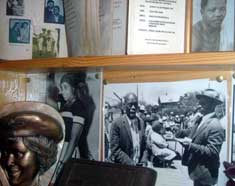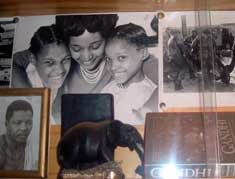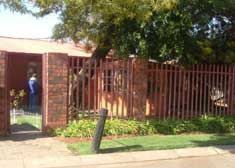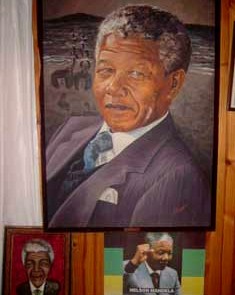The Mandela Family Museum
Philippa Garson
26 October 2004Nelson Mandela's humble little house in Orlando West, Soweto, now called the Mandela Family Museum, is an interesting stopover for those keen to imbibe a slice of authentic history on the world's most famous former prisoner.
The museum, a house comprising four inter-leading rooms, contains a rather higgledy-piggledy assortment of memorabilia, paintings and photographs of the Mandela family, as well as a collection of honorary doctorates bestowed on Mandela by universities and institutions around the world.
There's also a boxing belt from Sugar Ray Leonard, a multi-coloured cloak presented to the former president, and a row of his old boots.
The matchbox home, at 8115 Ngakane Street, was Mandela's first house. He moved there with his first wife, Evelyn Ntoko Mase, in 1946. After their divorce in 1957, she moved out.
When Mandela married Winnie Madikizela in 1958, she joined him at the Soweto home.
However, during the ensuing years, when his life as a freedom fighter was all-consuming, Mandela seldom stayed there. He was the "Black Pimpernel", living a life on the run, until his arrest and imprisonment in 1962.
Madikizela-Mandela continued to live in the tiny house with her two daughters, Zeni and Zindzi, while Mandela was in jail. The house was petrol-bombed and set alight several times during this period.
House with memories
When he was released, Mandela refused to move to the more opulent home (also in Orlando West) that Madikizela-Mandela had built during his incarceration. He wanted only to return to the house of his memories.
However, after his release, he stayed there for a mere 11 days, as he was moved around from one secret location to the next until he settled into his present Houghton residence.
Mandela separated from Madikizela-Mandela in 1992 and the couple were divorced in 1996. But, although her ex-husband handed the house to the Soweto Heritage Trust, Madikizela-Mandela refused to relinquish it. Instead, in 1997, she turned it into the Mandela Family Museum and set up a pub and restaurant across the road.
During the inauguration of the museum, where bottles of "Mandela garden soil" were sold, Madikizela-Mandela said: "A lot of history was made here. This is where the 1976 students' uprising began, where the youth leadership met to change the face of South Africa."
Certainly, the area is steeped in struggle history. Just around the corner from the Mandela Family Museum is the Hector Pieterson Memorial and, even closer to Mandela's house, the spot where Pieterson actually fell.
Also close by, in Vilakazi Street, is Desmond Tutu's house. Both Mandela and Tutu were Nobel Peace Prize winners.
Mandela now lives with his third wife, Graca Machel, widow of former Mozambique president Samora Machel. The pair were married on Mandela's 80th birthday.
Although the Soweto house is now back in the hands of the Soweto Heritage Trust, plans for its refurbishment are constantly delayed, says Zodwa Nxumalo, a member of the trust and deputy chair of community development for the City of Johannesburg.
Heritage site
Part of the problem, she says, is that the house is a heritage site, and proposed alterations are placed under scrutiny and often rejected.
Currently the museum does not make the grade as a high-quality tourist experience, and the tour guides would certainly benefit from more training.
The Soweto Heritage Trust is keen to make the museum more tourist-friendly and monitor access to it more closely. This will entail building an additional room onto the tiny house and creating a controlled access point nearby.
Nxumalo says tourists frequently arrive in busloads, take pictures of the outside and then depart without paying the R20 access fee.
Furniture and carpets, which have deteriorated under the incessant traffic, must also be replaced and parts of the house restored.
While the Soweto Heritage Trust wants to buy up several houses in the block, create a tourist precinct and build a restaurant on a nearby hill, those who live near to the famous little house aren't budging, says Nxumalo.
The museum is open every day from 9.30am to 5pm. For more details, call (011) 936-7754.
Source: City of Johannesburg
|

















